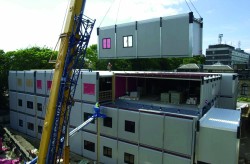According to the UK Green Building Council around 400 million tonnes of materials are used by the UK construction industry each year. New eco-friendly building techniques such as modular construction are predicted to play a key role in reducing the carbon footprint of the sector and improving its sustainability credentials. Here Jackie Maginnis Chief Executive of the Modular and Portable Building Association (MPBA) shares with the Offsite Hub how modular construction is shaping a more sustainable future.
The modular industry has recently been making national news headlines and has received universal acclaim for bringing much needed medical facilities onstream in record time. This has not only shone a spotlight on the sector, but we are witnessing a seismic shift to offsite technology which is becoming an increasingly dominant force in the construction industry.
At the forefront of offsite techniques, volumetric modular approaches are a game changer – reducing build times by an impressive 50-60% whilst increasing quality, productivity and safety.
But enhanced quality, speed and productivity are not the only benefits. In an industry where according to Transparency Market Research, annual construction waste is expected to reach 2.2 billion tons globally by 2025 – reducing landfill waste has to be a priority and modular construction provides a solution.
Individual modules are produced in factory settings, which allows better control over optimising material use. The surplus materials are recycled or reused for future projects, reducing the construction waste that ends up in landfill. Materials are protected from moisture and extreme weather conditions, reducing the risk of disposal through water ingress and damage. It is widely recognised that modular has the potential to reduce overall construction programmes, but it is not often acknowledged this approach can reduce up to 90% of waste generated when compared with traditional construction methods.
A key advantage of modular construction is the quality benefits which come from working in a controlled factory environment. By producing buildings in a factory setting, the quality of elements such as insulation can be better assured.
At the core of offsite manufacture, Design for Manufacture and Assembly (DfMA) protocols and Building Information Modelling (BIM) technology empowers optimal configuration of modular solutions by digitally connecting multi-discipline teams from the beginning of the concept design right through to the development process and beyond.
DfMA means buildings are conceived for offsite manufacture and assembly onsite. Whilst BIM facilitates early design detail and three-dimensional design information, minimising the risk of errors by eliminating the time-consuming process of translating engineers’ information into cutting lists and assembly drawings.
Modular builds are less susceptible to poorly specified manufacturers’ products as time can be taken upfront to validate the correct specification of materials. This allows clients to have confidence in the quality and performance that they can expect from their new building.
Designs are digitally constructed and virtually tested before they move onto the manufacturing phase. This process eliminates waste and achieves highly accurate and airtight building envelopes designed and built to higher sustainability requirements such as BREEAM and Passivhaus standards. Not only is the actual construction of the building ‘greener’ but the modules are also more energy- efficient – reducing heating requirements and in-use carbon emissions for the lifetime of the building.
It is easier to control energy use in a factory setting than in an open construction site. On average 67% less energy is required to produce a modular building and up to 50% less time is spent onsite when compared to traditional methods, resulting in up to 90% fewer vehicle movements which is less disruptive for the local community and reduces carbon emissions.
Modular approaches are revolutionising the construction industry. Whilst traditional build processes are laced with pitfalls, hidden costs and are highly disruptive – volumetric modular buildings are easy to plan, budget, and are quick to install. Modular technology brings a host of benefits to the construction industry, contributing to healthier, safer and more cost-efficient environments but often the sustainability gains are overlooked.
The modular way limits the amount of concrete in the ground, which is a significant issue for traditional builders. Eco-friendly materials are often specified and each individual component can be selected specifically for its performance characteristics, tailoring every inch of a modular build.
As the construction sector develops and adapts to meet changing Government strategies, I firmly believe the upward trajectory of modular will continue and although currently not making the headlines, climate change is a major crisis, and we need to act now to help mitigate the impact for future generation to come.
This blog has been provided by the MPBA. For more information, please visit www.mpba.biz









